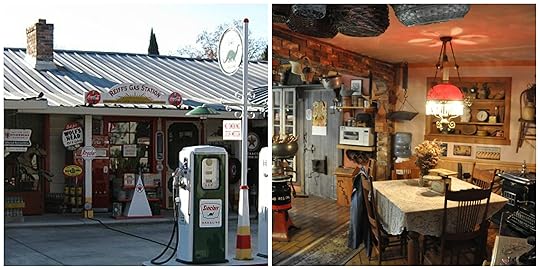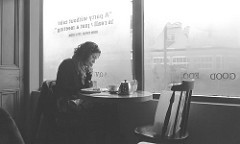Linda Westphal's Blog - Posts Tagged "writing-tips"
Lisa Montanino asks author Linda Westphal about writing, books, life, more
I had so much fun answering Lisa Montanino's questions. You can see a few of them below and the full interview on Lisa's blog, Accidental Bohemian.
Lisa Montanino interviews Linda Westphal —
Lisa: Do you write on a typewriter, computer, dictate or longhand?
Linda: I write on my Apple MacBook Pro laptop. I don’t write story paragraphs or scenes longhand, because I can type faster than I can write. My ideas for the story, however, are captured on paper in longhand and as voice memos on my iPhone.
Lisa: What is the best advice you’ve been given?
Linda: You’re a writer. Keep at it. Don’t worry about what other people think.
Lisa: What book do you think everyone should read?
Linda: The book’s title is TRAVELS, written by the late Michael Crichton. It’s a collection of memories from his travel adventures early in his life – both outer travel to places such as Bangkok, Kilimanjaro, Malaysia, and Jamaica (when people rarely traveled to these places) and inner travel (his personal spiritual exploration). His experiences are not only fascinating, but you’ll learn a little about yourself when you read this book. He was such a great writer. He starts the book with this sentence: “It is not easy to cut through a human head with a hacksaw.” (referring to his days as a medical student).
See more questions and answers here – Accidental Bohemian
Lisa Montanino interviews Linda Westphal —
Lisa: Do you write on a typewriter, computer, dictate or longhand?
Linda: I write on my Apple MacBook Pro laptop. I don’t write story paragraphs or scenes longhand, because I can type faster than I can write. My ideas for the story, however, are captured on paper in longhand and as voice memos on my iPhone.
Lisa: What is the best advice you’ve been given?
Linda: You’re a writer. Keep at it. Don’t worry about what other people think.
Lisa: What book do you think everyone should read?
Linda: The book’s title is TRAVELS, written by the late Michael Crichton. It’s a collection of memories from his travel adventures early in his life – both outer travel to places such as Bangkok, Kilimanjaro, Malaysia, and Jamaica (when people rarely traveled to these places) and inner travel (his personal spiritual exploration). His experiences are not only fascinating, but you’ll learn a little about yourself when you read this book. He was such a great writer. He starts the book with this sentence: “It is not easy to cut through a human head with a hacksaw.” (referring to his days as a medical student).
See more questions and answers here – Accidental Bohemian
Published on June 10, 2015 17:27
•
Tags:
author-interview, books, reading, writing, writing-tips
How research helps a fiction writer develop a sense of place
 Whether you are a reader who enjoys stories that take place in the 1950s, or a writer who is writing a story that is set in this time period, you will want to visit this place. I only live 30 miles from Mark Reiff's Gas Station Museum in Woodland, California, yet had no idea it existed. What a thrill it was to hear about it from a friend!
Whether you are a reader who enjoys stories that take place in the 1950s, or a writer who is writing a story that is set in this time period, you will want to visit this place. I only live 30 miles from Mark Reiff's Gas Station Museum in Woodland, California, yet had no idea it existed. What a thrill it was to hear about it from a friend!It made me think about the writing process and the importance of research. To see, touch, smell, hear and sense the vibe of the time or place where your story evolves is invaluable (at least it is for me when I write). All of these sensations become part of the book and help your words develop pictures in readers' minds.
Before I wrote THE MEDIUM, I traveled to Savannah, Georgia, and explored the city's Historic District for two weeks (read more about my visit here). Also, a visit to an old farmhouse in California's gold rush country inspired my novella, THE HERMIT BOOKSTORE.
It's not always possible for writers to travel to their story location; therefore, they rely on other research methods, such as reviewing online blogs, local newspapers and magazines, maps, travel books, or talking with people who are familiar with a region.
Every good novel worth reading requires some research. And it happens to be one of my favorite steps of the writing process.
Published on January 09, 2016 17:01
•
Tags:
1950s, the-hermit-bookstore, the-medium, writing, writing-tips
How to write better fiction

#1 - To write a great story, forget all the rules and just write. Write every day. Visit the story every day, even if it’s only to write one sentence. Keep at it until you reach the end. Then edit like crazy.
#2 - Look for story and character ideas in everything you do — books you read, movies and TV programs you watch, people you talk to, and while eavesdropping in public. Being observant is a very important characteristic of a writer.
#3 - The job of each chapter is to encourage readers to want to read the next chapter. That means revealing details slowly, just enough to build suspense so the reader wants to know what will happen next.
#4 - If you allow yourself to think about all the things that go into a novel — characters, themes, place, plot(s), ending — you'll get overwhelmed. Instead, break it down into smaller tasks. First develop the story’s theme. Then develop the characters and where the story will take place. The rest will likely come during the writing and editing process.
#5 - Write what you want to write, not what someone else recommends because it’s a popular genre.
#6 - Your research material will add depth and richness to your story. Learn to love the research process.
#7 - Don’t worry if your story isn’t long enough. The story will find its own natural length. If parts of the story need more, you’ll know it. If it has too much filler, you’ll know that too. Most readers like tight, efficient stories and don’t like rambling.
#8 - Get out into the world. Interact with it. Travel. Meet new people. It will all become part of your stories.
Published on April 05, 2016 17:29
•
Tags:
fiction, writing, writing-fiction, writing-tips



